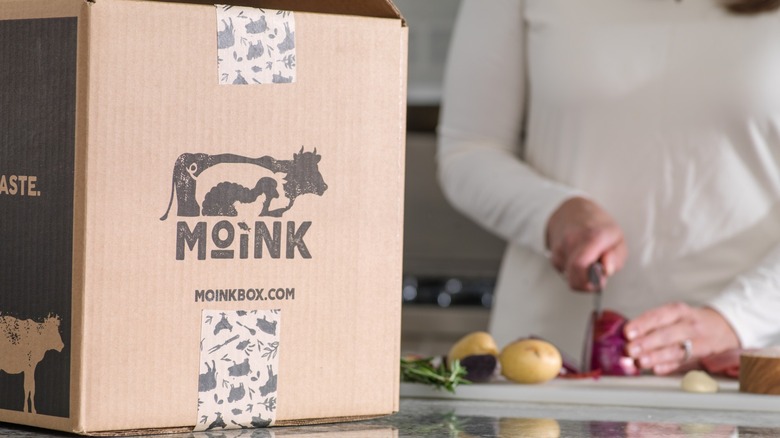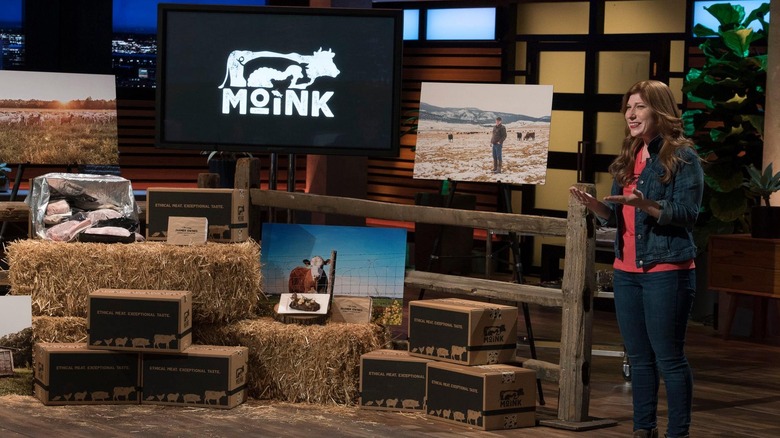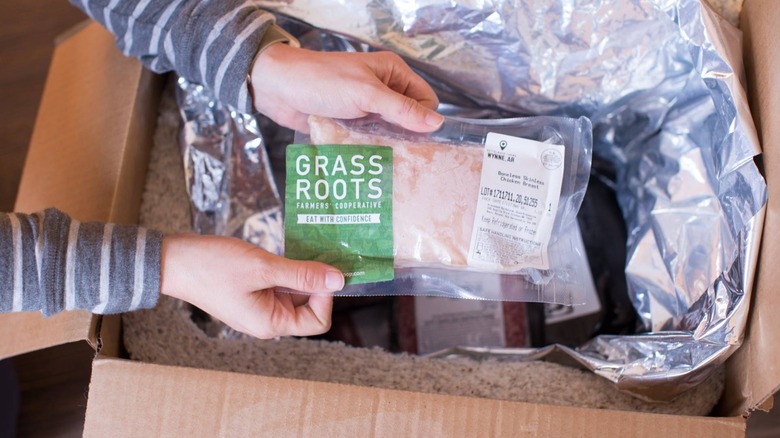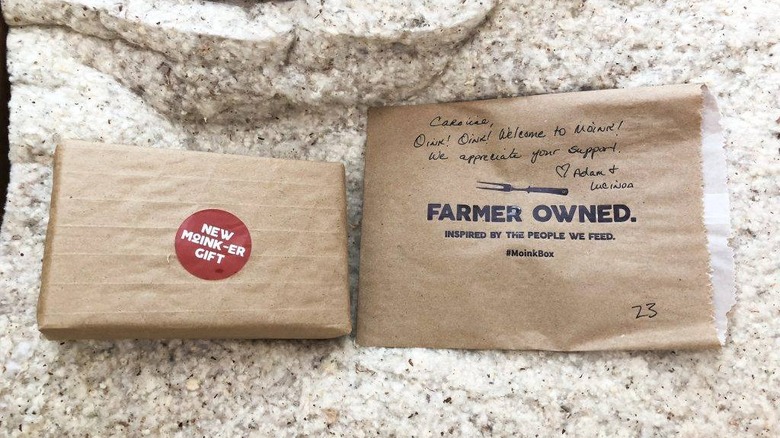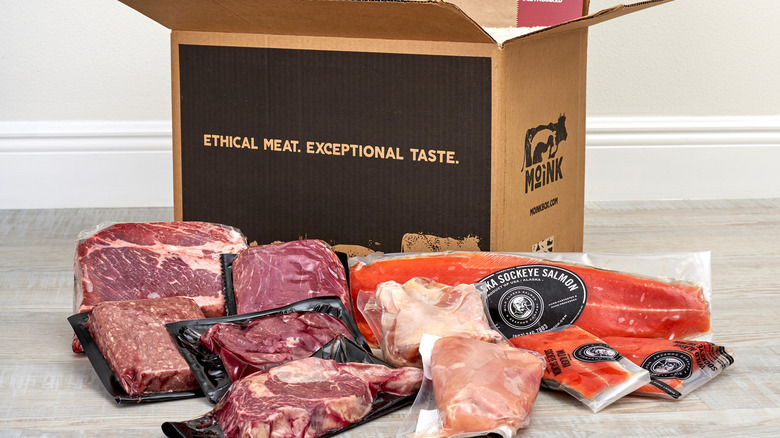Moink: Here's What Happened After Shark Tank
Eighth-generation farmer Lucinda Cramsey walked into season 10, episode 15 of "Shark Tank" with an important question that prompted her to come up with the concept for Moink: She was concerned about the living conditions of farmers — farmers who feed the nation yet struggle to provide for their own families. Cramsey had grown up on a 1,500-acre farm in Missouri which, after her father passed away, was left in the hands of her mother to run single-handedly. Struggling to feed a household of six, Cramsey's family was surrounded by acres of ripe land but still slept hungry.
Moink began with Cramsey's mission to help small family farms like hers who struggled to feed themselves in an industry where four companies controlled between 55% to 85% of key meat markets in the USA (via Forbes). To fuel her passion further, Cramsey realized that she also didn't quite have the stomach nor the taste for the methods employed to raise mass-produced meat. Together with her husband, fellow farmer, and eventually co-founder, Adam, Cramsey launched Moink — a meat subscription service that delivered ethically sourced, non-GMO meats cultivated in small family-run farms that were "humanely-raised" for "tender-hearted carnivores" like her (via Moink).
What happened to Moink on Shark Tank?
Cramsey pitched her business to the Sharks hoping to secure a $250,000 investment in exchange for a 10% stake in Moink, squarely putting the company's valuation at $2.5 million. Though touched by the entrepreneur's story and delighted by the taste and quality of Moink's meats — with Kevin O'Leary going so far as to claim that Moink's bacon was the best he had ever had — the company's valuation and its profit margins didn't sit well the Sharks.
Moink's sales had jumped from $85,000 in 2017 to $730,000 in 2018 and had maintained a customer retention rate of 71% — a big figure for subscription-based businesses — which impressed the Sharks, but its margins remained slim. An average order cost $127 to make and sold at $159, reducing the company's net profit to 10%.
Mark Cuban cited a partnership with another meat subscription company Echo Valley Meat as his reason for backing out whereas Lori Greiner reasoned that she didn't want to invest in something that she didn't eat much of — in her case, meat. Daymond John found Cramsey to be too defensive to partner with, leaving Guest Shark Jamie Siminoff as the only investor on the table. Arguing that his fellow Sharks had forgotten what it was like to run new businesses with expectedly terrible margins, Siminoff made Cramsey an offer for more than she had asked for. The entrepreneur parted with 20% equity but won over a $400,000 investment from Siminoff.
Moink after Shark Tank
Not only did Cramsey walk out of the Tank with nearly double the investment that she was hoping for, but the deal with Siminoff seems to have actually held through after the show aired. Siminoff even bought a farm of his own in Cramsey's neighborhood of LaBelle in late 2019. But it wasn't all good news: While most companies report increased publicity and a rise in sales after "Shark Tank," Moink's founder took to Facebook to offer an honest view of what came in the six months after the episode aired.
Orders came pouring in after "Shark Tank," and Moink ran out of its free-range chicken, disappointing a great chunk of customers. There were issues with FedEx that delayed deliveries in the week of the fourth of July; packing errors plagued Moink after moving warehouses; and troubles with dry ice thawed their meats long before they reached anyone's kitchens. There were a lot of angry customers and the entrepreneur was plagued with scathing comments from conventional farmers who claimed that Moink was defaming their methods (which didn't meet Moink's ethical criteria) of producing meat. Amidst all the trolling, however, Cramsey also said that there was an outpouring of support after "Shark Tank." Fellow family-run farmers, in particular, reached out to Cramsey to thank her for representing their struggles on national television and speaking of the hardships that they go through. Turns out, Moink's appearance on "Shark Tank" was more than just a business pitch.
Moink is still in business
Years after its "Shark Tank" episode aired, Moink is still in business and thriving with the help of Siminoff, who Cramsey said "has been a better investor than I could have ever imagined ... a true pit bull in our fight for the family farm" (via Facebook). Moink reported sales worth $2.8 million the year after "Shark Tank" and has since outgrown its old pick-and-pack facility and moved to a bigger location in Kansas City to accommodate its scaling production.
Moink increased its network of small farmers to include 15 new farms in the years after the show and continues to vet and add more to its existing roster. Those ordering Moink's subscription boxes can even learn more about where their meat is coming from by reading about the farmers that the company partners with on its website. Moink now delivers its subscription boxes to 48 states (plus D.C.) across the country via UPS every Tuesday — and includes recipe cards as well as an in-house magazine with tips, recipes, and information about its farmers in each box. The subscriptions still go for $159 per box which, Cramsey explained in an interview with Forbes, takes into account the expenses borne by small farmers for raising animals the ethical way while also ensuring that Moink makes money, but at a reasonable cost that is still within the means for people to be able to afford.
What's next for Moink?
Moink's subscription boxes have virtually remained the same as they were on "Shark Tank," offering a mix of grass-fed beef and lamb, pastured pork and chicken, and wild-caught salmon. While it's unclear whether Cramsey plans on offering a wider selection of meats and seafood in her subscription boxes, the entrepreneur's focus has been on expanding Moink's network of small farms. As of 2019, Moink had partnerships with 100 family farms across the country — a number that may very well rise in the years to come — and is expected to make six million in sales.
While Moink's sole offering is subscription boxes, it does sell one-off gift boxes on occasions such as back-to-school-themed packs with chicken tenders and burger parties or special boxes for Christmas. Fans could very well expect more holiday-themed meat boxes over the festive seasons to come. As for the future of Moink itself? Cramsey hopes that Moink's meats will one day make their way from subscription boxes to grocery stores — but until then, the entrepreneur plans to focus on boosting her online sales. If all goes well, the fiery entrepreneur hopes to go head to head with a big-name player, telling Forbes, "One day I'd like to take on Tyson ... I'm cocky enough to say if you do the right thing, people will taste the difference."

